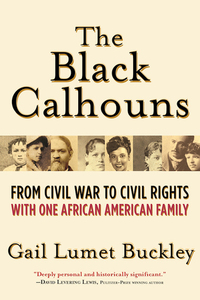Take a photo of a barcode or cover
7 reviews for:
The Black Calhouns: From Civil War to Civil Rights with One African American Family
Gail Lumet Buckley
7 reviews for:
The Black Calhouns: From Civil War to Civil Rights with One African American Family
Gail Lumet Buckley
I found myself highlighting passages and flagging pages because this book is filled with so much great historical information. However, the issue is that it reads exactly like a high school history text book--choppy sentences and inconsistent paragraph/fact flow. The constant shifting from one fact to another without any formal sentence/paragraph transition is distracting. Prior to reading Ms. Buckley's book, I was under the impression Ms. Horne was distantly related to John C. Calhoun, former vice president of the U.S. from South Carolina. The book debunks that rumor, which is still prevalent. Additionally, I noticed no mention of Ms. Horne interacting with the Atlanta Calhouns. Did she attend the 1993 family reunion? With all the fascinating information packed into the 300+ pages, I still have a few questions.
informative
medium-paced
A well done look into the history of an African American family who's two branches of linage became famous ground breakers for every generation after the civil war with the middle and ladder half of the book focusing on Lena Horne. Towards the end the back and forth of the North and South of the family got a bit tedious with going back and forth in time every few pages. The last few chapters of the book were a just a brush through the times from the 1970's to the 2010's with the highlights but still good. An interesting read into an interesting family and a good look at the past and how the nation was divided long after the civil war.
Marked down from five stars only because it needed an editor to cut down on some of the repetition. But I learned a lot, particularly about the way in which Blacks, and especially southern Blacks, got left behind during the New Deal. And Lena Horne's own story is fascinating. Recommended.
The information was interesting however I struggled with the pacing, following the different branches of the family tree.
IQ "Later he [James Weldon Johnson] would say that 'the race problem in the United States has resolved itself into a question of saving black men's bodies and white men's souls" (111)
The structure of this book is somewhat a mess and that proved to be very distracting. The author provided too much commentary for my taste, one minute she'd be delving into great historical detail and the next she'd share her opinions on her family members or attempt to describe what they must have been feeling or try to make some connection to the 21st century. It's almost as if this would have been better served as a novel. The author makes astute observations but their placement in the book doesn't fit and it takes away from what would have otherwise been smooth historical reading. You can also tell she's very passionate about the military because she goes into extensive detail about military escapades, even ones not involving her family. Buckley also repeats the same stories quite a few times which is annoying since it's an issue that could have been easily avoided with some editing.
This is an amazing family saga and I'm glad it's being told, Lena Horne was not the only extraordinary member of this family. And it's great to read about upper middle class Black families succeeding throughout every generation after slavery. Through her family's history the author manages to convey a riveting history of America and I could not put the book down. Her family manages to be connected to several major figures in American history and all the major historical events which makes the book even more interesting. I found her explanation for why Atlanta became a hub for Black people especially helpful, she essentially says Atlanta's white people cared more about business than they did racism. Perhaps that's a well known treatise, but it was new to me.
I'm thrilled this is being made into a TV series, I really hope they do the book justice because it has the possibility to be epic from the casting to the costumes. This book really upholds the old adage "truth is better than fiction", I just wish the structure of the book had been better.
The structure of this book is somewhat a mess and that proved to be very distracting. The author provided too much commentary for my taste, one minute she'd be delving into great historical detail and the next she'd share her opinions on her family members or attempt to describe what they must have been feeling or try to make some connection to the 21st century. It's almost as if this would have been better served as a novel. The author makes astute observations but their placement in the book doesn't fit and it takes away from what would have otherwise been smooth historical reading. You can also tell she's very passionate about the military because she goes into extensive detail about military escapades, even ones not involving her family. Buckley also repeats the same stories quite a few times which is annoying since it's an issue that could have been easily avoided with some editing.
This is an amazing family saga and I'm glad it's being told, Lena Horne was not the only extraordinary member of this family. And it's great to read about upper middle class Black families succeeding throughout every generation after slavery. Through her family's history the author manages to convey a riveting history of America and I could not put the book down. Her family manages to be connected to several major figures in American history and all the major historical events which makes the book even more interesting. I found her explanation for why Atlanta became a hub for Black people especially helpful, she essentially says Atlanta's white people cared more about business than they did racism. Perhaps that's a well known treatise, but it was new to me.
I'm thrilled this is being made into a TV series, I really hope they do the book justice because it has the possibility to be epic from the casting to the costumes. This book really upholds the old adage "truth is better than fiction", I just wish the structure of the book had been better.
Rating: 3.5* of five, rounded up
There is a television miniseries on its way via ABC Studios. Here's to hoping they do it justice.
My goddesses. There is so much I personally don't know about the African American history of my own country. The saga of the Calhouns is epic, and an instructive look at the roots of white nationalism in the demagoguery of politicos hoping to be elected to office. Vile, disappointing, unsurprising given today's terrors.
The author understandably focuses on her famous mother, Lena Horne, for specifics and anecdotes to enliven her historical thesis about the existence and condition of an African American elite in each decade following the American Civil War. That's inevitable, I suppose; had she done otherwise, assuming she possessed the information to do so, this book would've been as thick as a Bible and about as interesting. Gadzooks were there a lot of Calhouns and cousins and families and friends and husbands and...well, let's just say that a four-line summary of the huge majority of the dramatis personae still pumps us to over 300pp of relatively dry material.
It's the relatively dry part that bothers me the most. I am entirely sure that Author Buckley possesses the chops to do more with even cursory mentions than is done here. I am even more sure that fewer names and more anecdotes/reminiscences/stories would've made for a deliciously readable, dare I say it novelistic, book.
Not that there is a single thing *wrong* with this book. There's a slightly slippery slope in the alternating north/south chapter format; it starts to feel forced. Believe me when I tell you that this isn't anything more than a quibble. I don't at all want to give you the impression that the book isn't a terrific investment of your eyeblinks, especially my fellow white folks who are earnestly seeking some road signs in this complicated minefield that is race relations. It helps that Author Buckley has a background in history. Her potted course in American race relations is richer for it.
Don't miss this chance to learn about race-related issues in a relatively painless way, from the "other" side of the issue.
There is a television miniseries on its way via ABC Studios. Here's to hoping they do it justice.
My goddesses. There is so much I personally don't know about the African American history of my own country. The saga of the Calhouns is epic, and an instructive look at the roots of white nationalism in the demagoguery of politicos hoping to be elected to office. Vile, disappointing, unsurprising given today's terrors.
The author understandably focuses on her famous mother, Lena Horne, for specifics and anecdotes to enliven her historical thesis about the existence and condition of an African American elite in each decade following the American Civil War. That's inevitable, I suppose; had she done otherwise, assuming she possessed the information to do so, this book would've been as thick as a Bible and about as interesting. Gadzooks were there a lot of Calhouns and cousins and families and friends and husbands and...well, let's just say that a four-line summary of the huge majority of the dramatis personae still pumps us to over 300pp of relatively dry material.
It's the relatively dry part that bothers me the most. I am entirely sure that Author Buckley possesses the chops to do more with even cursory mentions than is done here. I am even more sure that fewer names and more anecdotes/reminiscences/stories would've made for a deliciously readable, dare I say it novelistic, book.
Not that there is a single thing *wrong* with this book. There's a slightly slippery slope in the alternating north/south chapter format; it starts to feel forced. Believe me when I tell you that this isn't anything more than a quibble. I don't at all want to give you the impression that the book isn't a terrific investment of your eyeblinks, especially my fellow white folks who are earnestly seeking some road signs in this complicated minefield that is race relations. It helps that Author Buckley has a background in history. Her potted course in American race relations is richer for it.
Don't miss this chance to learn about race-related issues in a relatively painless way, from the "other" side of the issue.

